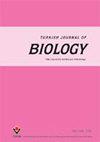Androgen receptor contributes to repairing DNA damage induced by inflammation and oxidative stress in prostate cancer
IF 0.9
4区 生物学
Q3 BIOLOGY
引用次数: 0
Abstract
Background: Androgen deprivation therapy remains the first-line therapy option for prostate cancer, mostly resulting in the transition of the disease to a castration-resistant state. The lack of androgen signaling during therapy affects various cellular processes, which sometimes paradoxically contributes to cancer progression. As androgen receptor (AR) signaling is known to contribute to oxidative stress regulation, loss of AR may also affect DNA damage level and the response mechanism in oxidant and inflammatory conditions of the prostate tumor microenvironment. Therefore, this study aimed to investigate the role of AR and AR-regulated tumor suppressor NKX3.1 upon oxidative stress-induced DNA damage response (DDR) in the inflammatory tumor microenvironment of the prostate. Materials and methods: Intracellular reactive oxygen species (ROS) level was induced by either inflammatory conditioned media obtained from lipopolysaccharide-induced macrophages or oxidants and measured by dichlorodihydrofluorescein diacetate. In addition to this, DNA damage was subsequently quantified by counting gH2AX foci using an immunofluorescence-based Aklides platform. Altered expression of proteins function in DDR detected by western blotting. Results: Cellular levels of ROS and ROS-induced DNA double-strand break damage were analyzed in the absence and presence of AR signaling upon treatment of prostate cancer cells by either oxidants or inflammatory microenvironment exposure. The results showed that AR suppresses intracellular ROS and contributes to DNA damage recognition under oxidant conditions. Besides, increased DNA damage due to loss of NKX3.1 under inflammatory conditions was alleviated by its overexpression. Moreover, the activation of the DDR mediators caused by AR and NKX3.1 activation in androgen-responsive and castration-resistant prostate cancer cells indicated that the androgen receptor function is essential both in controlling oxidative stress and in activating the ROS-induced DDR. Conclusion: Taken together, it is concluded that the regulatory function of androgen receptor signaling has a vital function in the balance between antioxidant response and DDR activation.雄激素受体参与前列腺癌炎症和氧化应激诱导的DNA损伤修复
背景:雄激素剥夺治疗仍然是前列腺癌的一线治疗选择,主要导致疾病转变为去势抵抗状态。在治疗过程中缺乏雄激素信号会影响各种细胞过程,这有时会矛盾地促进癌症的进展。由于已知雄激素受体(雄激素受体,AR)信号通路参与氧化应激调节,AR的缺失也可能影响前列腺肿瘤微环境氧化和炎症条件下DNA损伤水平和反应机制。因此,本研究旨在探讨AR及AR调控的肿瘤抑制因子NKX3.1在前列腺炎性肿瘤微环境中氧化应激诱导的DNA损伤反应(DDR)中的作用。材料和方法:用脂多糖诱导的巨噬细胞获得的炎症条件介质或氧化剂诱导细胞内活性氧(ROS)水平,用二氯二氢荧光素测定。除此之外,随后使用基于免疫荧光的Aklides平台通过计数gH2AX焦点来量化DNA损伤。western blotting检测DDR蛋白功能表达的改变。结果:我们分析了在氧化剂或炎症微环境暴露治疗前列腺癌细胞时,在AR信号缺失和存在的情况下,ROS和ROS诱导的DNA双链断裂损伤的细胞水平。结果表明,AR抑制细胞内ROS,有助于氧化条件下DNA损伤识别。此外,炎症条件下NKX3.1缺失导致的DNA损伤增加通过其过表达得到缓解。此外,AR和NKX3.1在雄激素应答和去势抵抗的前列腺癌细胞中激活DDR介质表明雄激素受体的功能在控制氧化应激和激活ros诱导的DDR中都是必不可少的。结论:综上所述,雄激素受体信号的调节功能在平衡抗氧化反应和DDR激活之间具有重要作用。
本文章由计算机程序翻译,如有差异,请以英文原文为准。
求助全文
约1分钟内获得全文
求助全文
来源期刊

Turkish Journal of Biology
BIOLOGY-
CiteScore
4.60
自引率
0.00%
发文量
20
审稿时长
6-12 weeks
期刊介绍:
The Turkish Journal of Biology is published electronically 6 times a year by the Scientific and Technological
Research Council of Turkey (TÜBİTAK) and accepts English-language manuscripts concerning all kinds of biological
processes including biochemistry and biosynthesis, physiology and metabolism, molecular genetics, molecular biology,
genomics, proteomics, molecular farming, biotechnology/genetic transformation, nanobiotechnology, bioinformatics
and systems biology, cell and developmental biology, stem cell biology, and reproductive biology. Contribution is open
to researchers of all nationalities.
 求助内容:
求助内容: 应助结果提醒方式:
应助结果提醒方式:


